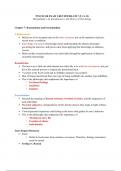PSYCH 248 EXAM 2 REVIEWER (CH 7-9, 11-12) Hergenhahn’s An Introduction to the History of Psychology
Chapter 7: Romanticism and Existentialism Enlightenment
➢Beliefs are to be accepted only on the basis of reason, not on the authority of priests, sacred texts, or tradition
➢Knowledge was power . Knowledge meant understanding the abstract principles governing the universe, and power came from applying that knowledge to influence society
➢Believed that societal perfection was achievable through the application of objective (scientific) knowledge Romanticism ➢The best way to find out what humans are really like is to study the total person, not just his or her rational powers or empirically determined ideas
➢“A return to the lived world and to childlike openness was needed” ➢Idea of being transformed from one type of being (unfilled) into another type (fulfilled)
➢This is the philosophy that emphasizes the importance of ○Irrational feelings ○Intuitions ○Instincts Existentialism ➢Stressed the meaning of human existence, freedom of choice , and the uniqueness of each individual ➢Personal subjective , interpretations of life and the choices they make in light of those interpretations ➢Viewed personal experience and feeling as the most valid guides for one’s behavior ➢This is the philosophy that emphasizes the importance of ○Meaning in one’s life ○Freedom of choice
○Individuality Jean-Jacques Rousseau ➢Emile ○Belief in God comes from emotion, not reason. Therefore, feelings (emotions) must be trusted ➢Feeling vs. Reason ○“Man is born free and yet we see him everywhere in chains” ○Justifiable government for him was one that allowed humans to reach their full potential and to fully express their free will ○Untouched human nature ○Distrusted reason, organized religion, science, and societal laws as guides for human conduct ➢Noble Savage ○Humans were born intrinsically good (natural impulses)
○Belief that the first impulse of behavior is always right, if people are allowed to honestly express themselves ➢Human nature ○Humans in the state of nature are: ■Peaceful, content, and equal ○Socialization creates: ■Inequality, competitiveness, and egocentrism ➢The General Will ○Each person has a private will and a general will ○The person must choose the general will when there is a conflict in order to live in
harmony with the community ➢Education ○Education should take advantage of natural impulses rather than distort them ○Education should create a situation in which a child’s natural abilities and interests can be matured Johann Wolfgang von Goethe ➢Life consisted of opposing forces such as love and hate, life and death, and good and evil ➢The goal of life should be to embrace these forces rather than to deny them ➢Views human liberty as the ultimate source of happiness ➢Demonstrated that sensory experiences could be objectively studied by a form on introspection ➢Insisted that intact, meaningful psychological experience should be the object of the study rather than meaningless, isolated sensations ➢Employed behavior therapy ➢Saw science as limited
○Many important human attributes were beyond the grasp of the scientific method Arthur Schopenhauer ➢We can never know the noumenal world ➢Will to Survive
○In humans, the noumena, the “thing in itself” is the will to survive ○It is a mindless, non-irrational urge that exists at the base of our instinctual drives as well as in everything in the universe ○Causes an unending cycle of needs and need satisfaction ➢Suffering caused by wisdom had a nobility associated with it but that the life of a fool was simply without higher meaning ➢Another way of viewing life as the postponement of death. Death must always be the ultimate victor. ➢Most people do not cling to life because it is pleasant, They cling to life because they fear
death ➢Sublimation and Denial ○Believed that a major goal for humans is to gain insight into their existence ○The proper adjustment to this tragic condition is to struggle to rise above it or, at least to minimize it ○He believed that humans can rise above their mere fulfillment of biological needs and enjoy some degree of happiness by pursuing interests that did not involve the need of satisfaction ○Sublimation: Channel one form of energy to something else (Freud) ➢The Importance of the Unconscious Mind ○All humans have rational and irrational part of the mind ■Rational: mostly conscious and involved intellectual processes ■Irrational: was unconscious and involved basic drives ○“Consciousness is the mere surface of our mind, and of this, as of the globe, we do not know the interior, but only the crust” ○Repressing undesirable thoughts into the unconscious and of the resistance encountered when attempting to recognize repressed ideas ■Unwanted thoughts were repressed Soren Kierkegaard ➢Most meaningful relationship with God was a purely personal one that was arrived at through an individual’s free choice, not one whose nature and content were dictated by the church ➢Religion as Too Rational and Mechanical ○He rejected science as too mechanistic: he thought it prevented us from viewing humans as choosing beings ○Ultimate state of being was arrived at when the individual decided to embrace God and take God’s existence on faith without needing a logical, rational, or scientific explanation ➢Truth is Subjectivity ○Truth is what one believed in at the emotional level ○Truth could not be arrived at rationally ➢Methods ○Used rhetorical methods to shake the foundations of what people believed to be true, or took for granted ○Encourage them to rebuild their own knowledge




